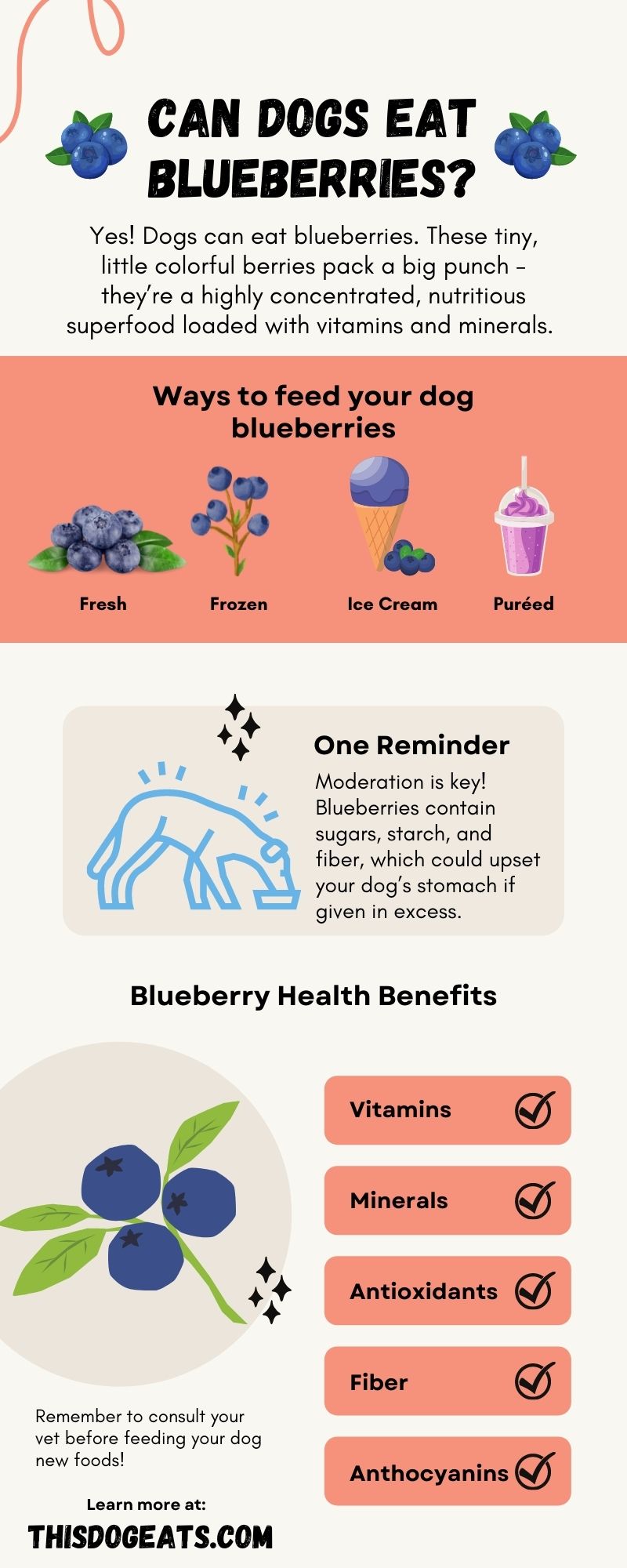Can dogs eat blueberries?
Blueberries. They’re one of the most popular fruits eaten in the United States, and with good reason. These tiny, little colorful berries pack a big punch – they’re a highly concentrated, nutritious superfood loaded with vitamins and minerals. That makes them both delicious and nutritious! But can your dog enjoy these tasty berries alongside you? Yes! Read on to learn more about what makes this superfood worthy of a place in your fridge.
Can dogs eat blueberries?
Yes! Dogs can eat blueberries.
There’s a reason why so many dog food and dog treat companies tout blueberries as an ingredient. These berries offer tremendous health benefits for your dog. Plus, they’re bite sized, delicious, and easy to sprinkle in a dog food bowl or hand out as treats.
However, there are some things you should know before you share them with your dog. And as always, it’s a good idea to consult with your veterinarian before adding any new foods or supplements to your dog’s diet.

Are Blueberries Good for Dogs?
Yes! Blueberries are not referred to as superfoods for nothing.
Blueberries are low in calories and jam packed with nutrients and vitamins. They’re also famously filled with antioxidants that work to improve health, both for you and your dog. In fact, they carry the highest amount of antioxidants for a fruit by weight. That’s pretty good for this tiny blue berry!
Let’s take a deeper dive into all the vitamins, minerals and nutrients that blueberries have to offer:
There was a study published in which Alaskan sled dogs were evaluated after prolonged periods of exercise. The research discovered that adding antioxidant rich supplements or foods to the sled dog’s diets reduced the effects of exercise-induced oxidative damage.
It also lowered their recovery time overall. The study shows that blueberries, which just so happen to be rich in antioxidants, especially benefit active dogs, and help with mobility.

Feeding Your Dog Blueberries
Blueberries make a great treat for your dogs. Just remember, as with all treats, they should be fed to your dog in moderation. We like to follow the 90/10 rule, where 90% of your dog’s daily calories come from balanced meals, and about 10% come from treats.
When preparing the blueberries, follow these steps:
- Wash and rinse the blueberries. Rinse them thoroughly to wash off any preservatives, pesticides, or dirt. This is especially important if your blueberries are not organic.
That’s it. You read it right, that’s pretty much all you have to do before serving up these little Violet Beauregardes – any Willy Wonka fans out there?
Now, although there’s really only one way to get your blueberries ready to consume, there’s a myriad of ways to eat them! The possibilities are pretty much endless.
Here are a few safe ways to feed your dog blueberries:
- Whole: Blueberries already come in bite sized pieces, so after washing, hand ‘em over and let your dog enjoy!
- Frozen: Freeze the berries whole in a Tupperware or Ziploc bag. You can also freeze blueberries with water or coconut water in an ice cube tray for a longer lasting treat. Frozen blueberries are great as a treat on a hot summer day!
- Purée: Purée fresh blueberries. You can serve up as a blueberry smoothie, or freeze the purée in an ice cube tray.
- Dried: Dehydrated blueberries make great crunchy, bite sized treats or food toppers.
- Mashed: Mash blueberries into a jam. Serve alone or as a food topper. Great for dogs with few to no teeth!
- Blueberry ice cream: Blend frozen blueberries or blueberry purée with plain, unsweetened yogurt. This makes a refreshing, delicious blueberry dog-friendly ice cream. Be sure the yogurt has no added sugars, sweeteners, or flavors, and that Xylitol isn’t listed in the ingredient list.
Don’t forget – you should always ask your veterinarian before sharing human foods with your dog, and blueberries are no exception. And be sure to monitor your dog closely after giving them blueberries as a treat for the first time.

Can my dog eat blueberries safely?
Blueberries are small and don’t pose much of a threat, but beware, if your dog is teeny, tiny, a whole blueberry might be a choking hazard. This is especially true if the blueberries are frozen. If that’s the case and your dog is particularly small, cut them in half before freezing, or mash them.
Also, don’t allow your dog to gobble endless berries, especially while unsupervised. They may grab too many and choke. Offer them one or two at a time, when hand feeding, and if you use the berries as a food topper, spread them out or mix them into the food.
Other possible dangers include:
Over-eating: Since they’re small, it’s easy to eat too many blueberries, especially if you’re not supervising your dog or if you grow a blueberry bush in your yard. Blueberries contain natural sugars, starch, and fiber, which could upset your dog’s stomach or cause diarrhea if given in excess. Moderation is key!
Allergies: It’s extremely rare, but on the off-chance that your dog is allergic to blueberries, don’t feed them. Pretty obvious, right? Be on the lookout for signs of adverse allergic reactions, especially when you give your dog blueberries for the first time. Signs to look out for include itchiness, trouble breathing, and sneezing.

How many blueberries can my dog eat?
We like to follow the 90/10 rule, where 90% of your dog’s daily calories come from balanced food, and 10% come from treats. Blueberries would most likely be given as a treat, and since 10% isn’t much, portion control is important.
For small dogs, 10 or so blueberries would be appropriate. Larger dogs can tolerate more, but as always, speak to your vet when deciding what’s best.
Can my dog eat blueberry muffins?
Ok, so we know that blueberries themselves are safe and healthy for your dog, but what about blueberry muffins? Muffins are delicious and sweet, and a staple in almost every cafe or American pastry shop. So are they ok to feed to your dog?
No, you should not feed your dog blueberry muffins.
Muffins often contain unhealthy ingredients that your dog shouldn’t consume, like an excess amount of sugar. They might give your dog an upset stomach or make them sick.
Some commercially prepared muffins might even be made with artificial blueberry flavoring or artificial sweeteners, which certainly won’t be good for your dog. When it comes to your dog, skip the muffins and eat them yourself.

Can my dog eat blueberry pie?
Similar to muffins, blueberry pies are a dessert that contain ingredients that aren’t healthy, like lots of sugar and butter. It can lead to an upset stomach, weight gain, diabetes, or worse.
Skip the blueberry pie and give your dog something else.
Can my dog eat blueberry pancakes?
You should probably skip the blueberry pancakes as well. While a small bite may not do much damage, pancakes are still made with ingredients that aren’t the healthiest for canines: sugar, butter, refined bleached flour, etc.
Can my dog eat blueberry yogurt?
It depends! Dogs can safely eat plain yogurt that contains few ingredients, like blueberries.
But yogurt, particularly store bought versions, generally contains added sugars. They might even contain artificial sweeteners such as xylitol. It’s a less nutritious form of eating blueberries, with little nutritional benefit.
If you’ve made a healthier, unsweetened blueberry yogurt at home, feel free to feed it to your dog in moderation. You can allow them to lick it, add it to a Kong, or freeze it in ice cube trays.

Can my dog eat packaged or processed blueberry foods?
They probably shouldn’t. Store-bought foods often contain preservatives and/or artificial flavors, chemicals, and more. These aren’t exactly healthy for your dog, and add no nutritional value to their diet. Skip the packaged and processed foods and go for fresh blueberries instead.
Now that you’ve learned all about dogs and blueberries, check out other fruits your dog can eat.








